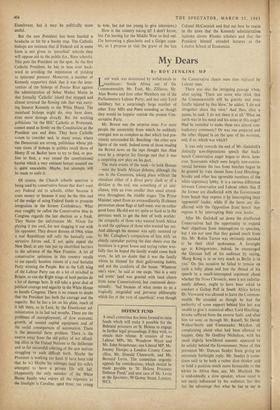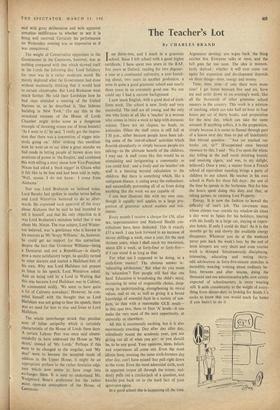My Dears
By ROY JENKINS MP T AST week was dominated by withdrawals or I./expulsions: South Africa out of the Commonwealth; Mr. Foot, Mr. Zilliacus, Mr. Alan Brown and four other Members out of the Parliamentary Labour Party; and not only Lord Saliibury but a surprisingly large number of other Tory MPs and Peers sounding as though they would be happier outside the present Con- servative Party.
Mr. Brown was the surprise item. For most people the anonymity from which he suddenly emerged was as complete as that which had pre- viously surrounded Dr. Beeching—the other new figure of the week. Indeed some of those reading the Brown news on the tape thought that Alan must be a misprint for George and that it was a surprising new ploy on his part.
The main events of the week—in both Houses —were the South African debates, although the one in the Commons, taking place without the stimulant either of a direct party clash or of a division at the end, was something of an anti- climax, with an even smaller than usual attend- ance throughout the middle stages. The Prime Minister, apart from an extraordinarily ill-chosen peroration about flags at half-mast, was on rather good form. He did not try quite so hard as In the previous week to get the best of both worlds: the sympathy of those who wanted South Africa in and the applause of those who wanted her out. And although his manner was aptly summed up by Mr. Callaghan's comparison of him with 'an elderly caretaker putting the dust sheets over the furniture in a great house and saying rather wist- fully that he hoped the family would come back soon,' he left no doubt that it was the family whom he blamed for their gallivanting habits, and not the comforts of the house. 'Whatever one's view,' he said at one stage, 'this is a very sad event' (and was greeted with loud cheers from some Conservatives), but continued deter- minedly: 'Sad because of what seems to us a tragically misguided and perverse philosophy which lies at the root of apartheid,' even though the Conservative cheers were then replaced by Labour ones.
There was also the intriguing passage when, after saying. 'There are some, who think that the Commonwealth will be gravely and even fatally injured by this blow,' he added, 'I do not altogether share this view.' And then, after a pause, he said, 'I do not share it at all.' What on earth was in his mind and his notes at this stage? Had he intended to make these two almost con- tradictory comments? Or was one prepared and the other slipped in on the spur of the moment, and, if so, which was which?
It was only towards the end of Mr. Gaitskell's distinctly non-disputatious speech that back- bench Conservative anger began to show, how- ever. Statements which were largely non-contro- versial between the two front benches began to be greeted by irate shouts from Lord Hinching- brooke and other less agreeable members of the white supremacy lobby. It is a curious difference between Conservative and Labour rebels that if the former are disaffected with the Government front bench they express it by interrupting their opponents' leader, while if the latter are dis- affected with the Opposition front bench they express it by interrupting their own leader.
After Mr. Gaitskell sat down the disaffected Conservatives had the opportunity to expand their objections from interruptions to speeches, but I am not sure that they gained much from this. Mr. Robin Turton was obviously intended to be their chief spokesman. A fortnight ago at Konigswinter, indeed, he encouraged the German half of his audience by saying, 'Hong Kong is to us very much as Berlin is to you.' On this occasion he failed to remain on such a lofty plane and lost the thread of his speech in a much-interrupted argument about whether the News Chronicle, were it not unfortu- nately defunct, ought to have been asked to conduct a Gallup Poll in South Africa before Dr. Verwoerd was allowed to leave the Common- wealth. He sounded as though he had the authority of some support behind him but was unable to give it oratorical effect. Lord Hinching- brooke suffered from the reverse fault; and after him we went on through Mr. Russell, Sir Derek Walker-Smith and Commander Maydon, all complaining about what had been allowed to happen. Only Sir Godfrey Nicholson, with his usual slightly bewildered manner, appeared to be solidly behind the Government. None of this prevented Mr. Duncan Sandys from giving an extremely forthright reply. Mr. Sandys is some- times said to be both a rather slow thinker and to hold a position much more favourable to the whites in Africa than, say, Mr. Macleod. He is undoubtedly a slow speaker, whose mind is not easily influenced by his audience, but this has the advantage that what he has to say is said with great deliberation and with apparent complete indifference to whether or not it is being well received. Certainly his performance on Wednesday evening was as impressive as it was unequivocal.
The weight of Conservative opposition to the Government in the Commons, however, was as nothing compared with that which showed itself in the Lords the following day. Lord Salisbury for once was in a rather moderate mood. He merely deplored what the Government had done without necessarily thinking that it would lead to certain catastrophe. But Lord Brabazon went much farther. He told their Lordships how he had once attended a meeting of the United Nations in, as he described it, 'that hideous building in New York.' (To say this in the ormolued excesses of the House of Lords Chamber might strike some as a dangerous example of throwing stones out of brass houses.) 'As I went to it,' he said, 'I really got the impres- sion that there was a convention of nigger min- strels going on.' After striking this emollient note he went on to say what a great mistake we had made in letting people of brown skins into positions of power in 'the Empire,' and combined, this with telling a story about how Vice-President Nixon had asked a 'buck nigger' in Ghana what it felt like to be free and had been told in reply, 'Well, massa. I do not know: I come from Alabama.'
Nor was Lord Brabazon an isolated voice. Lord Barnby had spoken in similar terms before and Lord Winterton hastened to do so after- wards. He expressed such approval of the story about Alabama that he said he had intended to tell it himself, and that his only objection to it was Lord Brabazon's mistaken belief that it was about Mr. Nixon. The true subject, Lord Winter- ton believed, was 'a gentleman who is known to his enemies as Mr. Soapy Williams.' As, however, be could get no support for this correction, despite the fact that Governor Williams—being a Democrat and not a Republican—is clearly now a more satisfactory target, he quickly turned to other matters and started a Hailsham-bait of his own. Why was Lord Hailsham not present to listen to his speech, Lord Winterton asked. And on being told by a Lord in Waiting that this was because Lord Hailsham was in Cabinet, he commented acidly, 'We seem to have quite a lot of Cabinets nowadays.' However, he con- soled himself with the thought that as Lord Hailsham was not going to hear his speech, there was no need for him to stay and listen to Lord Hailsham.
The whole interchange struck that peculiar note of feline antipathy which is curiously characteristic of the House of Lords these days. A certain Labour Peer was once said absent- mindedly to have addressed the House as 'My dears,' instead of 'My Lords.' Perhaps if this were to be changed to the singular, and `My dear' were to become the accepted mode of address in the Upper House, it might be an appropriate preface to the rather feminine edgi- ness which now seems to have crept into exchanges there. It is easy to understand Mr. Wedgwood Benn's preference for the rather more open-air atmosphere of the House of Commons.



































 Previous page
Previous page